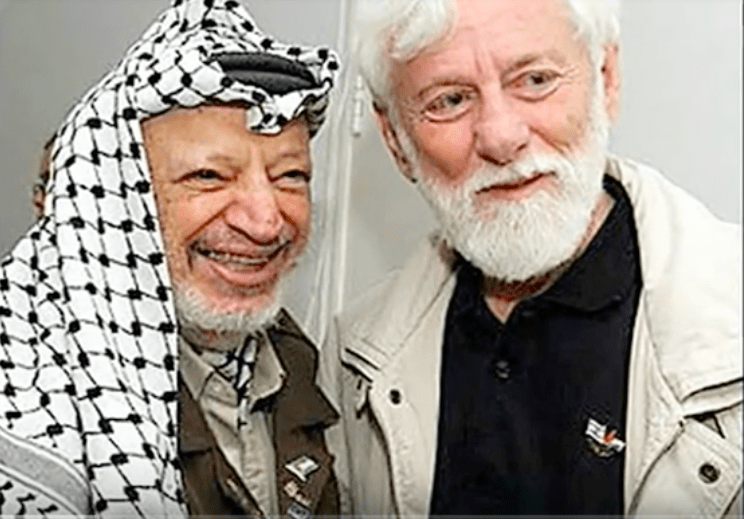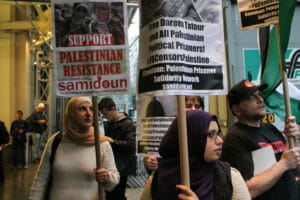Uri Avnery, Israeli Journalist and Palestinian Rights Champion, Dies at 94
One of the first of his countrymen to meet Palestinian Liberation Organization leader Yasser Arafat, he was a singular figure in Israeli society. Uri Avnery (right) and Yasser Arafat. (Screenshot / YouTube)
Uri Avnery (right) and Yasser Arafat. (Screenshot / YouTube)
Uri Avnery, a veteran politician and journalist, and one of the first Israeli advocates for a Palestinian state, died Monday at 94 in Tel Aviv, the Israeli newspaper Haaretz reports.
He was, as Haaretz columnist Chemi Shalev writes in his own separate Haaretz remembrance, “first and foremost, a dissident,” and a singular figure in Israeli society. Shalev explains, “It’s hard to convey the full scope of Avnery’s omnipresence on the Israeli scene.”
Avnery, Shalev writes, was a “trailblazing journalist, radical politician one-man resistance movement and towering Jeremiah rolled up into one. He was part Edward Murrow, part Che Guevara, part William Randolph Hearst and part Larry Flynt.”
Avnery’s family moved to Israel from Germany in 1933, when Avnery was 10. At 15, he fought in the Irgun, an underground militia fighting both Arab and British forces in a push to establish the state of Israel.
By the 1948 war for independence, however, Avnery had a change of heart. As he explained in a 2014 interview with Haaretz: “What in my eyes is the great success is that I and my friends raised for the first time the principle that there is a Palestinian people with whom we have to make peace at the end of the 1948 war. … I don’t think there were 10 people in the world that believed in this. Today it is a world consensus.”
After being wounded in the 1948 war, Avnery purchased HaOlam Hazeh, turning the weekly news magazine into an independent, anti-establishment publication. This was at a time, as his New York Times obituary points out, “when party newspapers were the norm.”
HaOlam Hazeh pulled no editorial punches. As the Times obituary notes, the publication:
Attacked the first prime minister, David Ben-Gurion, and his socialist Mapai party; exposed corruption; flouted censorship rules; and, according to the National Library of Israel, “spoke out emphatically against the security services, which it felt acted in a manner unworthy of a democratic state.”
Not content to be simply a journalist, Avnery also served two terms in the Knesset, Israeli’s parliament. He resigned in 1981 in the middle of a third term, to become a founding member of two small left-wing parties. He made contact with members of the Palestine Liberation Organization in 1974 while still a Knesset member.
He met PLO founder Yasser Arafat in Beirut in 1982, when, the Times writes, “It [the city] was under siege at the height of Israel’s first war in Lebanon. At the time, most Jewish Israelis reviled Mr. Arafat as an archterrorist.” Avnery was always ahead of his time, as the Israeli government eventually signed peace accords with the PLO in 1993.
In 1993, Avnery also started Gush Shalom (Peace Bloc), an Israeli movement in support of the establishment of a Palestinian state next to Israel, with Jerusalem as the capital of both, as well as dismantling the Israeli settlements in Palestinian territory, part of the two-state solution still being sought today.
At the end, Avnery had “mixed feelings” about the progress of his life’s work, Haaretz concludes.
“On the one hand,” the obituary reports, “he was convinced he had turned his political ideas—first and foremost his support for establishing a Palestinian state alongside Israel—into a “global consensus.” On the other, he admitted he had failed to realize these ideas politically.”
Read the full obituaries in Haaretz and The New York Times.
Your support matters…Independent journalism is under threat and overshadowed by heavily funded mainstream media.
You can help level the playing field. Become a member.
Your tax-deductible contribution keeps us digging beneath the headlines to give you thought-provoking, investigative reporting and analysis that unearths what's really happening- without compromise.
Give today to support our courageous, independent journalists.






You need to be a supporter to comment.
There are currently no responses to this article.
Be the first to respond.